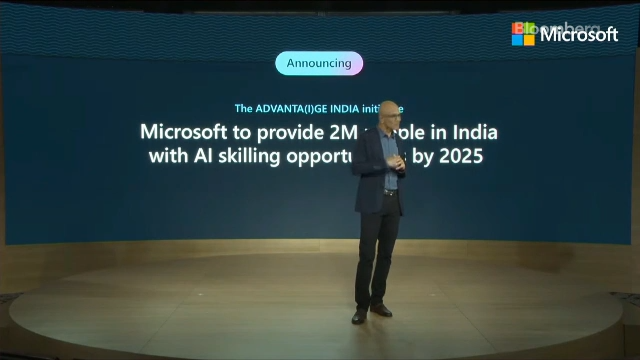Microsoft CEO Satya Nadella’s recent visit to India sparked renewed discussions about the nation’s burgeoning Artificial Intelligence (AI) landscape. His statement that “AI has bridged the gap between India and the world” raises pertinent questions about the multifaceted impact of AI on this diverse nation. He also said that Microsoft will uptake an AI upskilling initiative to empower 2 million people in India by 2025.

Microsoft’s Role in India’s AI Advancement
Nadella’s optimism is grounded in the firsthand observation of India’s rapid AI adoption. Microsoft’s ambitious goal of skilling 2 million individuals in AI by 2025 underscores the company’s faith in India’s AI potential. The widespread adoption of Microsoft’s Copilot by leading IT firms such as HCLTech and Infosys further validates this confidence. These instances exemplify how AI is permeating various sectors in India, catalyzing innovation and transformation.
Unique AI Applications in India
While the notion of “bridging the gap” simplifies India’s AI journey, it holds merit. India is not merely catching up; it is innovating with tailor-made AI solutions to address its distinctive challenges. Unlike developed nations with entrenched systems requiring AI retrofitting, India has the opportunity to build solutions from scratch. Examples include financial inclusion through AI-powered microloan platforms, enhanced healthcare access for underserved communities via AI-driven diagnostics and chatbots, and improved agricultural efficiency through AI solutions optimizing farming practices.
Milestones in India’s AI Journey
While Microsoft’s initiatives are noteworthy, India’s AI landscape is full of impressive milestones. Bhavish Aggarwal’s Krutrim is an example, leveraging AI for fraud detection and risk management.
Government support, particularly from the Ministry of Electronics and Information Technology (MeitY), plays a pivotal role in fostering AI research and development. India’s vibrant AI startup ecosystem tackles diverse challenges and attracts global attention, showcasing the nation’s entrepreneurial spirit and innovation prowess. Premier institutions like IITs and IISc contribute to AI research, enriching the global knowledge base and positioning India as a hub for cutting-edge research and innovation.
Opportunities for India in AI
India’s AI trajectory presents numerous opportunities for economic growth, social impact, and global competitiveness. AI has the potential to stimulate productivity and innovation across sectors, fostering economic growth and job creation. Additionally, AI-driven solutions can address critical social issues, including healthcare, education, and agriculture, thereby improving quality of life and promoting inclusive growth. Furthermore, a skilled AI workforce can position India as a competitive player in the global market, attracting investment and bolstering its reputation as an innovation hub.
Challenges
However, these opportunities are accompanied by challenges that require careful consideration. Ethical concerns, such as bias, privacy, and job displacement, must be addressed to ensure responsible AI development and deployment. Clear and adaptable regulatory frameworks are essential to mitigate risks and foster trust in AI technologies. Moreover, bridging the digital divide and ensuring equitable access to AI benefits is imperative for promoting inclusive growth and addressing societal disparities.
By acknowledging challenges, fostering responsible development, and leveraging indigenous talent and innovation, India can bridge gaps and fulfill its aspirations for a brighter future. Collaboration among government, industry, academia, and civil society is essential to harness AI as a force for good, empowering citizens and propelling India towards shared prosperity and progress.































